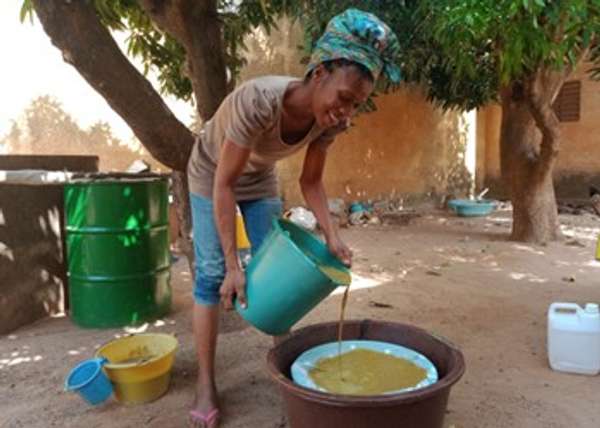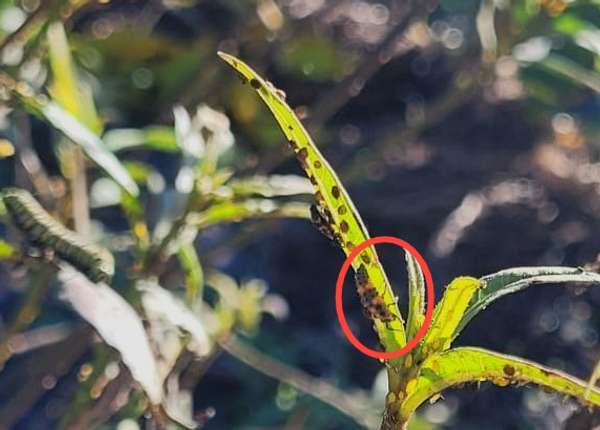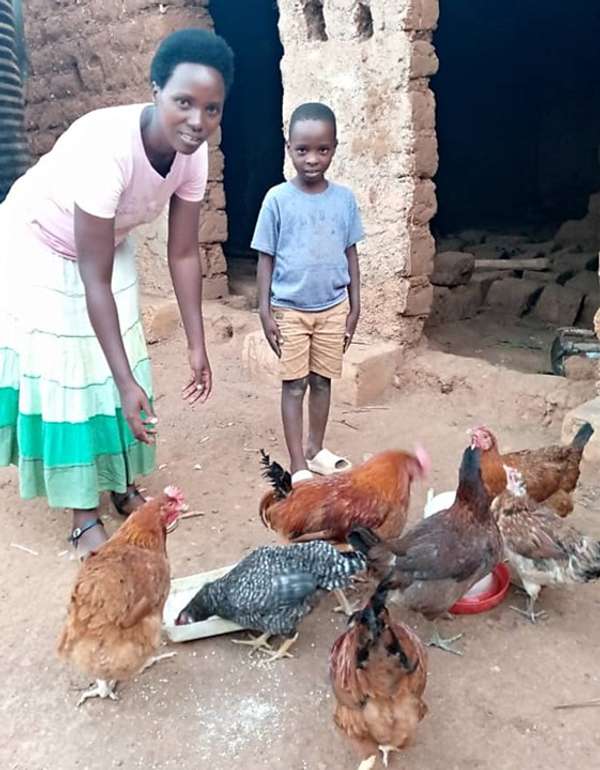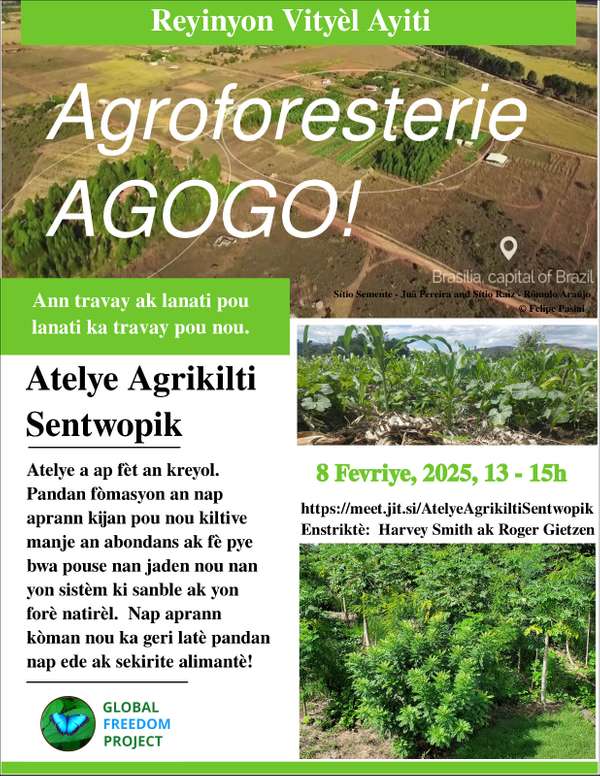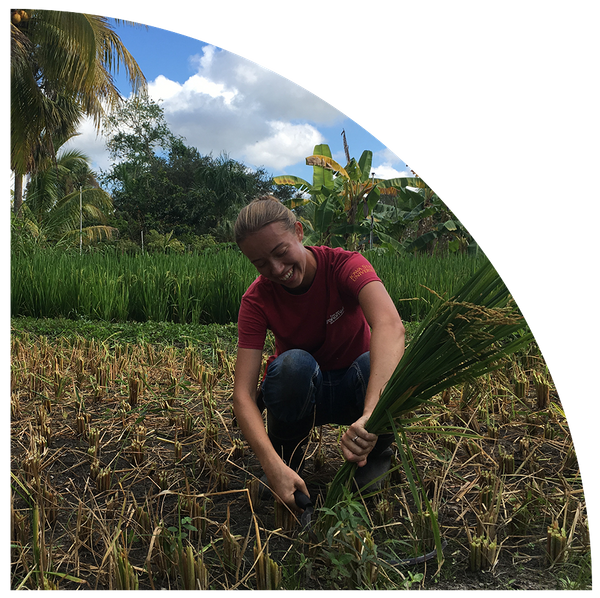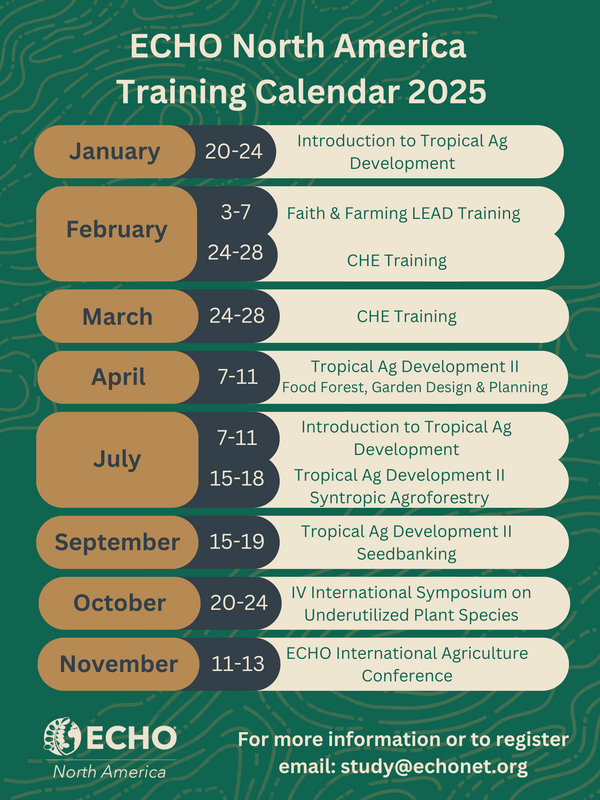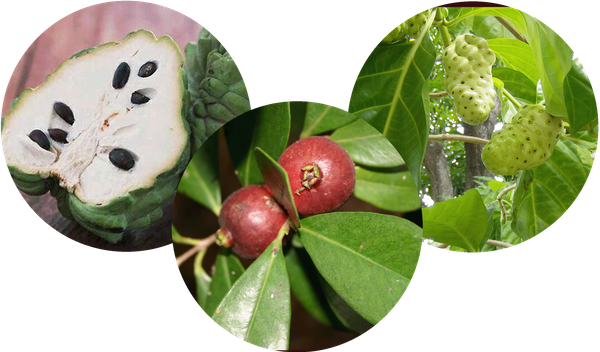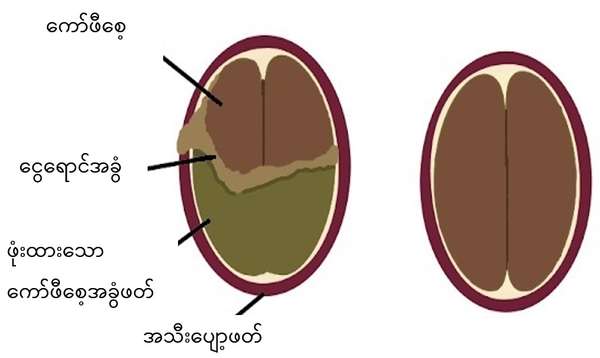ECHOcommunity Actualizaciones
Upcoming Spring Trainings 2025-02-18
We have two more trainings coming up this spring you can still sign up for in North America!
March 24-28: TOT With CHE Global Network
To learn more information about this course and to register use the link below.
April 7-11: TAD 2 - Food Forest, Garden Design, and Planning
Interested in starting your own food forest in your back yard? Your school? Your church? Click the link below for more details about this course and to sign up.
EDN Número 168 Disponible Ahora 2025-02-11
Temas de Relieve
- Abono líquido protector orgánico de 10 días
- Comparación de tallos de banano crudos, hervidos y fermentados para su uso en alimento para cerdos
- Aguas grises para regar las plantas
- Del Banco de Semillas de ECHO: Vigna vexillata, Una leguminosa multipropósito con tubérculos comestibles
- Libros, Sitios Web y Otros Recursos: Invitación a presentar artículos y Expositores y temas destacados para el Simposio sobre Cultivos Infrautilizados
Abono líquido protector orgánico de 10 días
Hassan Djebro
Extracto:
Para proteger las plantas contra las plagas y las enfermedades, así como para acelerar el crecimiento de las plantas, trate las semillas con el abono líquido protector antes de sembrarlas. Primero, cubra 1 kg de semillas en 250 ml de abono líquido protector no diluido. Luego seque las semillas a la sombra antes de sembrarlas. Para proteger las raíces de plantas y esquejes hortícolas, remoje las raíces de las plantas hortícolas (cebolla, tomate, lechuga, repollo, etc.) y los esquejes (caña de azúcar, mandioca, papas, etc.) en una dilución de 250 ml de abono líquido protector a 1 L de agua durante 30 minutos antes de sembrarlas. Para la fertilización de cultivos, se diluye el abono líquido protector y luego se utiliza en todos los cultivos, ya sea mediante rociado/pulverización, riego o aplicación alrededor de las plántulas y árboles frutales.
ECHO East Africa Update: Lablab (Ngwara) 2025-02-04
During the Ngwara field day, Mr. Emmanuel Kasembe, Iles de Paix Tanzania Technical Advisor, and Bonny, ECHO East Africa Technical Advisor, facilitated an open discussion on Ngwara-related topics. The discussion covered various aspects, including planting techniques, uses, markets, and more. Visitors had the opportunity to test the seed coat removal machine designed by Engineer Naomi from Agriculture Seed Agency. The prototype underwent testing using Ngwara seeds. The removal of seed coats reduces cooking time of the seeds. Other experienced Ngwara cooks who visited the ECHO table during the day suggested avoiding the removal of seed coats before cooking, as it results in the loss of certain nutrients found in the seed coats. As part of the day's activities, ECHO interns served Ngwara beans and cooked Ngwara leaves to the event participants.
Encouraging predatory insects in your garden 2025-01-28
Our normal instinct upon finding any pest species, such as aphids, in or anywhere near our gardens is to eradicate all of them. However, is this always the best course of action? An important part of integrated pest management is encouraging predatory species of insects in your garden. Predatory insects need a certain level of pest insects to feed on, otherwise their populations will decline. The lack of predatory insects can then lead to even higher levels of pests in the next life cycle.
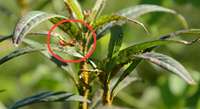
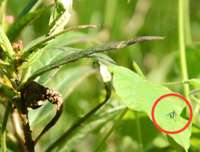
If you have any examples of plants that serve as predatory species banks like this, we would love to hear about them in the ECHO Community.
Community Animal Health Worker New Resources! 2025-01-21
ECHOcommunity’s collection of Community Animal Health Worker (CAHW) Resources has been enhanced recently by the addition of 3 outstanding offerings. Vétérinaires Sans Frontières International has recently published a Handbook for Planning and Managing CAHW Programmes (2024) with translations in English, French, Spanish, Portuguese, and Arabic.
From the International Animal Health Consultants, we have received 3 translations (English, Mandarin, French) of the Handbook for Animal Health (2007/2018).
And from the Christian Veterinary Mission, we have received 3 translations (English, Spanish, Thai) of Where There is No Animal Doctor (Rev 2016).
Additional translations will be posted if they become available. All of these books are downloadable in the ECHO Community Mobile App, as well.
Agroforesterie AGOGO! 2025-01-15
Tout moun yo akeyi yo rantre nan Harvey ak tèt mwen pou yon fòmasyon sou entènèt teyori syntropic. Si ou te patisipe nan atelye nou an nan tan lontan, se pral menm sijè a nou te kouvri la. Li pral an Kreyol sèlman. Si w konnen yon moun ki ka benefisye, tanpri pataje envitasyon an. Tout moun akeyi. Anba a se lyen pou rantre nan apèl videyo a. Li ka louvri ak yon navigatè. Pa bezwen jwenn aplikasyon an oswa kreye yon kont. Mwen tann evènman an.
Roger
2025/2026 ECHO North America Internship Application Deadline 2025-01-14
We are looking for passionate, mission minded, farm loving applicants for the 2025/26 ECHO North America Regional Impact Center internship. This year-long program is an intensive hands-on training in tropical agriculture for community development.
Apply soon! Applications close January 20th. Use the link below for more information about the internship and how to apply.
ECHO North America 2025 Upcoming Trainings 2025-01-07
We have some exciting training opportunities coming up in 2025!
Registration for these trainings include:
- Instruction with on-farm workshops
- Consultation with experienced staff
- Food (breakfast, lunch and dinner)
- Lodging
Don’t miss the these training opportunities!
Seasonal Seeds Available from the ECHO Global Seed Bank 2024-12-24
Some seeds are only seasonally available from our ECHO Global Seed Bank due to their short lifespan. We would like you to know that we have the following seeds available right now. Click the crop name for more information:
- Green sugar apple (Annona squamosa) is a medium to tall tree that produces sweet, creamy fruits. Fruits are mature when green.
- Atemoya (Annona squamosa X cherimola) is a deciduous fruit tree up to 7m tall. Cross between sugar apple and cherimola.
- Noni (Morinda citrifolia) is a small tree from Southeast Asia that is tolerant of a wide range of soil conditions. Noni is often used medicinally.
- Strawberry fruit (Muntingia calabura) is a fast-growing, fruit producing shade tree. Edible, sweet red fruit.
ကျွဲနွားတိရစ္ဆာန်အတွက်အစာအဖြစ်အစားထိုးရန်ကော်ဖီစေ့အခွံမျာ 2024-12-19
ဤဆောင်းပါသည် ဘွန်ဆွန်း သန်ရှရီသွန်၊ အေဘရမ် ဂျေ၊ ဘစ်လာ နှင့် ပက်ထရစ် ဂျေ၊ ထရေးလ်တို့မှပြုလုပ်ခဲ့သည့် အီးစီအိပ်ချ်အို သုတေသနကို အကျည်းချုပ်ထားခြင်းဖြစ်သည်။
ထို့အပြင် ကော်ဖီစေ့အခွံဖတ် ၂၀၀ ဂရမ်သို့မဟုတ် ၁ကေဂျီ ရှိသည့်လယ်ယာ-ထုတ် ထပ်ဆောင်းအစာကိုမစားမီနှင့် စားပြီး သည့်နွားများ၏ခန္ဓာတွင်းရှိစဲလ်အရေအတွက်ကိုတိုင်းတာရာတွင်စာရင်းကိန်းဂဏန်းအရသိသာထင်ရှားသော ခြားနားမှုကိုတိုင်းတာမှုအားလုံးတွင်မတွေ့ရပါ။စမ်းသပ်မှုအားလုံးတို့တွင်ခန္ဓာတွင်းရှိစဲလ်အရေအတွက်များသည်နို့စိမ်း အတွက် ထိုင်းနိုင်ငံ စိုက်ပျိုးရေးစံချိန် သတ်မှတ်ချက်အတိုင်းအတာဖြစ်သည့် ၅၀၀,၀၀၀ စဲလ်/မီလီ အောက် တွင်ရှိ သည်(စိုက်ပျိုးရေးဆိုင်ရာကုန်ပစ္စည်းနှင့်အစားအသောက်ဆိုင်ရာစံနှုန်းများ နယ်ရှင်နယ် ဘရူရို၊ ၂၀၁၀)။ (ပုံ ၁၂)
.jpg?w=600)
